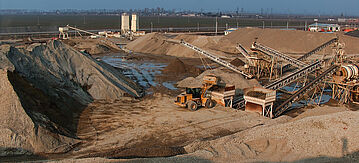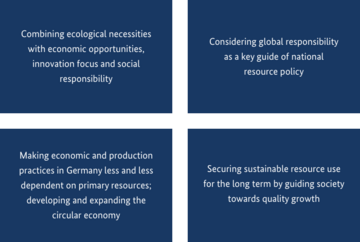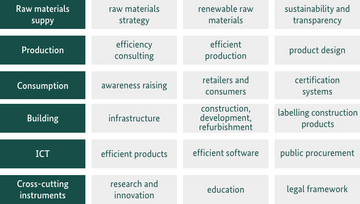Overview of German Resource Efficiency Programme (ProgRess)

Achieving more with less: The German Resource Efficiency Programme
With the adoption of the German Resource Efficiency Programme (ProgRess) in February 2012, Germany was among the first countries to determine targets, guiding principles and approaches to the conservation of natural resources. The German government is obligated to submit a report to the Bundestag on developments in resource efficiency in Germany every four years and to update the programme. The first update report, ProgRess II, was adopted by the Federal Cabinet on 2 March 2016, the second, ProgRess III, on 17 June 2020.
1. What is the programme about?
The overarching goal of the German Resource Efficiency Programme is to make the extraction and use of natural resources more sustainable and meet our responsibility to future generations by helping to secure the natural foundations of life for the long term.
The objectives of the German government are:
- to decouple economic growth as far as possible from resource consumption and reduce the associated environmental burdens
- to make the German economy more future-proof and competitive, thus promoting stable employment and social cohesion.
Voluntary measures and incentives play an important role in this context. Our resource efficiency policy is also an acknowledgement of our global responsibility for the ecological and social impacts of resource utilisation. The goal must be to permanently reduce global resource consumption.
ProgRess is based on the following four guiding principles:

ProgRess is based on the following four guiding principles: 1. combining ecological necessities with economic opportunities, innovation orientation and social responsibility. 2. see global responsibility as the central orientation of our national resource policy
3. gradually make economic and production methods in Germany less dependent on primary raw materials, and further develop and expand the recycling economy.
4. to ensure the sustainable use of resources in the long term through a social orientation towards qualitative growth.
2. Which areas are addressed?
ProgRess II topic areas

The thematic fields of ProgRess II are presented in tabular form: 1. raw material supply including raw material strategy, renewable resources and sustainability + transparency; 2. production including efficiency consulting, efficient production and product design; 3. consumption including awareness raising, trade + consumers, certification systems; 4. Closed-loop economy including product responsibility, recycling, preventing illegal exports; 5. construction including infrastructure, construction + development + renovation and labeling of building products; 6. information and communication technology (ICT) including efficient appliances, efficient software and public procurement; 7. comprehensive including research + innovation, education and legal framework
ProgRess describes measures for increasing energy efficiency along the entire value chain – from raw material extraction and product design to production, use and circular economy. One aspect of updating the programme is to address current challenges in order to further improve the programme's effectiveness.
The ProgRess III report incorporates current environmental policy challenges into the programme.
New elements of the update:
- stresses the importance of resource efficiency for achieving Germany’s climate targets,
- analyses the potential and risks of digital transformation in the field of resource efficiency,
- takes a look at mobility from the point of view of resource efficiency and
- identifies priority actions.
3. How does the update process work?
Comprehensive consultation processes are an important basis for updating ProgRess. Representatives of civil groups, associations and the Länder have the opportunity to comment on the draft programme and contribute their own proposals. Comprehensive public participation is vital for gaining broad acceptance of the programme. The citizens' dialogue for ProgRess III took place in May 2019 in three citizens' workshops comprising a total of 250 randomly selected members of the public. After the workshops, all interested citizens, irrespective of location, had the opportunity to participate in the online dialogue. The outcomes of the citizens’ workshops and the online dialogue were included in the annex to the ProgRess III report.
